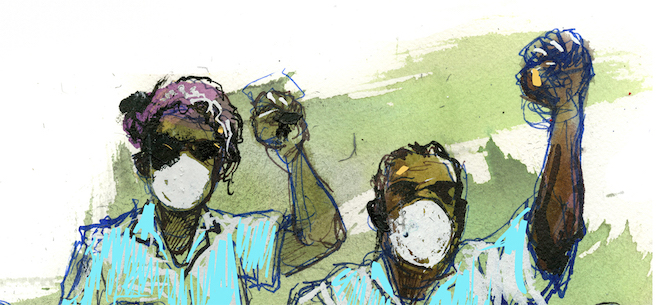The Chinese media’s praise for a Han Chinese man as a “model philanthropist” helping minority students in northwestern China’s Xinjiang has outraged Uyghur activists who note that China has jailed numerous Uyghur philanthropists under a mass internment drive that has created many orphans.
Shen Jianjia of Tikes county in Ghulja (in Chinese, Yining) was lauded for helping 175 Uyghur, Kazakh, and Kyrgyz students live in his home for free during the past 30 years while they completed their schooling in an article published on Tengritagh (Tianshan), the official website of the Xinjiang Uyghur Autonomous Region (XUAR) government.
The article describes Shen arriving back at his home on the evening of Feb. 15, China’s Lantern Festival, after celebrating the Lunar New Year in another part of the country. He and the four students, who live in his home while going to school, along with their parents gathered to celebrate the holiday with him.
With “wholehearted warmth Shen helped the children for many years with no regrets,” the article says.
One student had been living in Shen’s house for seven years from when he began junior high school until he graduated from the local vocational and technical school, according to the report.
“We celebrated a happy Lantern Festival together,” Shen is quoted as saying in the article.
The retired People’s Liberation Army soldier who is now a Chinese Communist Party (CCP) official in Tikes county moved to Xinjiang with his parents and five siblings when he was two years old, according to the report.
In the past few years, he has received awards from the Chinese government for being an “ideological and moral building exemplar,” a “model of ethnic unity,” and a “philanthropist.”
Ilshat Hassan Kokbore, vice president of the executive committee of the World Uyghur Congress (WUC), expressed disgust at what he said was propaganda about the former soldier in Xinjiang.
“A Chinese colonialist PLA soldier helping native children of East Turkestan has appeared in the Chinese media while millions of native Uyghurs have been imprisoned in camps and prisons, and their children have been deprived of parental care and have become the subjects of Chinese colonial boarding schools which are called ‘kindergartens of angels’ and ‘schools of angels,’” he said.
East Turkestan is Uyghurs’ preferred name for the Xinjiang region.
Kokbore said that the Chinese government needs such propaganda to cover up its colonial policies and genocide of Uyghurs in Xinjiang in light of accusations of genocide and crimes against humanity by some members of the international community.
“Their goal is very obvious — to cover up the genocide they are committing and to show that the CCP and its government is the savior and helper of the native people and to tell the world that what they are doing is good instead of evil,” he said.
Tragic fate of Uyghur philanthropists
RFA has previously reported that authorities have arrested and imprisoned Uyghur philanthropists who had made significant contributions to education and helped children in Xinjiang, as part of the Chinese government’s campaign to wipe out Uyghur society and culture.
Many of them have been among the 1.8 million predominantly Muslim Uyghurs and other Turkic minorities believed to be held in a network of detention camps in Xinjiang since 2017. Beijing has said that the camps are vocational training centers and has denied widespread and documented allegations that it has mistreated Muslims living in Xinjiang.
Kokbore said that the story of Shen Jianjia contrasted wildly with the tragic fate of Uyghur philanthropists such as Nutay Haji and others who focused their work on helping Uyghur children and students.
Nurtay Hajim, a respected businessman who amassed a fortune through an international tourism and a shipping firm, financed the establishment and operations of the Nurtay Iskender School for Orphans in Ghulja. The school offered free accommodation, food, and education for Uyghur children whose parents had died or were imprisoned. He is believed to have received a lengthy prison sentence in 2018.
Another Uyghur philanthropist, Ablimit Hoshur Halis Haji, was taken into custody in Xinjiang’s capital Urumqi (Wulumuqi) in 2018 by a unit of the State Security forces known as the Guobao. His detention was said to be directly linked to his establishment in 1994 of the Halis Foundation, a charitable organization whose goal was to help elite Uyghur students attain higher education and financial aid for study abroad.
“Our philanthropists … who opened schools for the orphans, including Chinese orphans, and who had done many times better than this Chinese soldier, were imprisoned and turned into criminals by this Chinese regime,” Kokbore said. “This is all about covering up their crime of genocide.”
Kokbore condemned China’s veneration of Shen Jianjia, because he was a member of the PLA, which has been the “backbone of repression” in Xinjiang since the occupation of the region by the Chinese Communist Party after 1949.
“By choosing and praising a former Chinese People’s Liberation Army soldier, the Chinese colonialist government was trying to justify Chinese PLA’s crimes against Uyghurs,” he said.
Turghunjan Alawudun, director of WUC’s religious affairs committee, said that China’s story about Shen as a form of domestic propaganda aims to undermine Uyghurs’ religious beliefs, customs, and culture on and that the government does not respect the religious freedom of ethnic minority groups as it claims it does.
“This is another lie by the Chinese government by saying that China is helping the native children of the Kazakhs, the Kyrgyz, and the Uyghurs,” he said. “While they are committing genocide against Uyghurs, they are telling this lie of a Chinese soldier being an angel who helps the children.”
“With this propaganda, China is trying hard to speed up the assimilation of native children,” he added.
The example of the Chinese philanthropist “is an open example of the Chinese policy to exterminate the Muslim faith of such children,” he told RFA.
“Uyghur children eating at a home of a Chinese is against our belief system in Islam,” he said. “The average Uyghur parent is against letting their children eat at a non-Muslim Chinese home.”
Translated by the Uyghur service. Written in English by Roseanne Gerin.
This content originally appeared on Radio Free Asia and was authored by By Mihriban.
This post was originally published on Radio Free.





